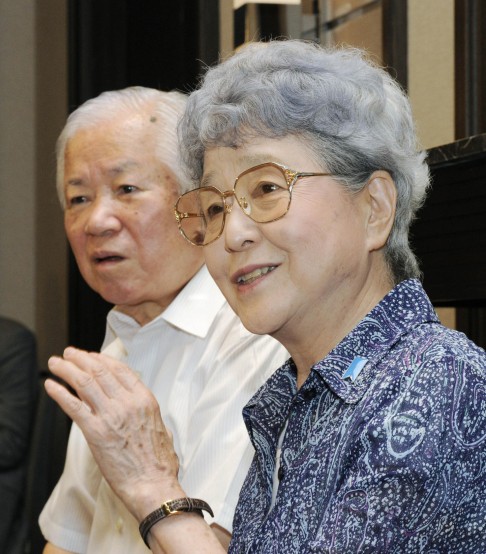
Japanese abductee's North Korean daughter meets relatives in Mongolia
26-year-old daughter of woman kidnapped aged 13 in 1977 and taken to North Korea meets her grandparents for the first time in Mongolia
The ageing parents of a Japanese woman who was kidnapped and taken to North Korea as a schoolgirl and allegedly died there have met her daughter for the first time.
Megumi Yokota's parents "spent time" with their granddaughter, Kim Eun-gyong, 26, and her family in the Mongolian capital, Ulan Bator, over five days last week, Japan's foreign ministry said yesterday.
Yokota, who North Korea claims killed herself in 1994, became a symbol of a bitter bilateral row over Pyongyang's abduction of Japanese nationals in the 1970s and 1980s, mainly aimed at training North Korean spies in Japanese language and customs. Tokyo rejects the claim that Yokota committed suicide as baseless.
Yokota's parents - father Shigeru, 81, and mother Sakie, 78 - had previously refused to meet Kim for fear of being used in North Korean efforts to establish their daughter's alleged death as fact.

"We cannot talk about it now. Please let us have a chance to rest calmly," Yokota's mother said in a statement to Japanese media.
In the Ulan Bator meeting, Kim reiterated to the Yokotas that her mother was dead, Jiji Press quoted Japanese government sources as saying.
Ulan Bator has often been used as a venue for Japanese and North Korean for unofficial contacts.
It was not clear if the meeting could help improve Tokyo-Pyongyang ties. But Japan's Kyodo news agency said the foreign ministry "embraced the meeting as a positive development and plans to seek the reopening of intergovernmental talks" between Japan and North Korea.
The two countries, which have no diplomatic relations, relaunched Red Cross talks on humanitarian issues this month, following a two-year break.
The meeting was arranged by foreign ministry officials from the two countries who attended the Red Cross talks in Shenyang, China, according to Japanese media reports.
Megumi Yokota was 13 when she was abducted by North Korean agents in 1977 on her way home from school in the city of Niigata by the Sea of Japan, known by the Koreas as the East Sea, and taken to North Korea by boat. North Korea admitted in 2002 having abducted a dozen Japanese nationals in the 1970s and 1980s. It said, without presenting conclusive evidence, that eight of them, including Yokota, were dead.
The Japanese government has demanded that North Korea come clean on the abduction issue, saying that the deaths cannot be true, owing to a lack of evidence and North Korean defectors claiming to have seen some of the victims alive after their alleged deaths.
Japan also believes there are more kidnapping victims.
In 2004, North Korea handed over to Japan cremated remains it claimed were Yokota's. However, Tokyo said DNA tests conducted in Japan proved the claim to be untrue.
North Korea has not yet committed itself to reinvestigating the abduction issue, preventing Japan from moving ahead with talks to open diplomatic ties which could be sweetened by the prospect of huge economic aid to the impoverished communist state. Pyongyang's nuclear and missile tests have also discouraged Tokyo from restarting rapprochement talks.
Kim Eun-gyong was born to Yokota and Kim Young-nam, a South Korean man abducted and taken to North Korea, according to North Korean explanations. DNA tests in Japan proved her biological relationship to Yokota.
Some Japanese media reports have said Megumi Yokota has become close to North Korea's ruling family and may know its secrets, one reason preventing the regime from letting her go.
